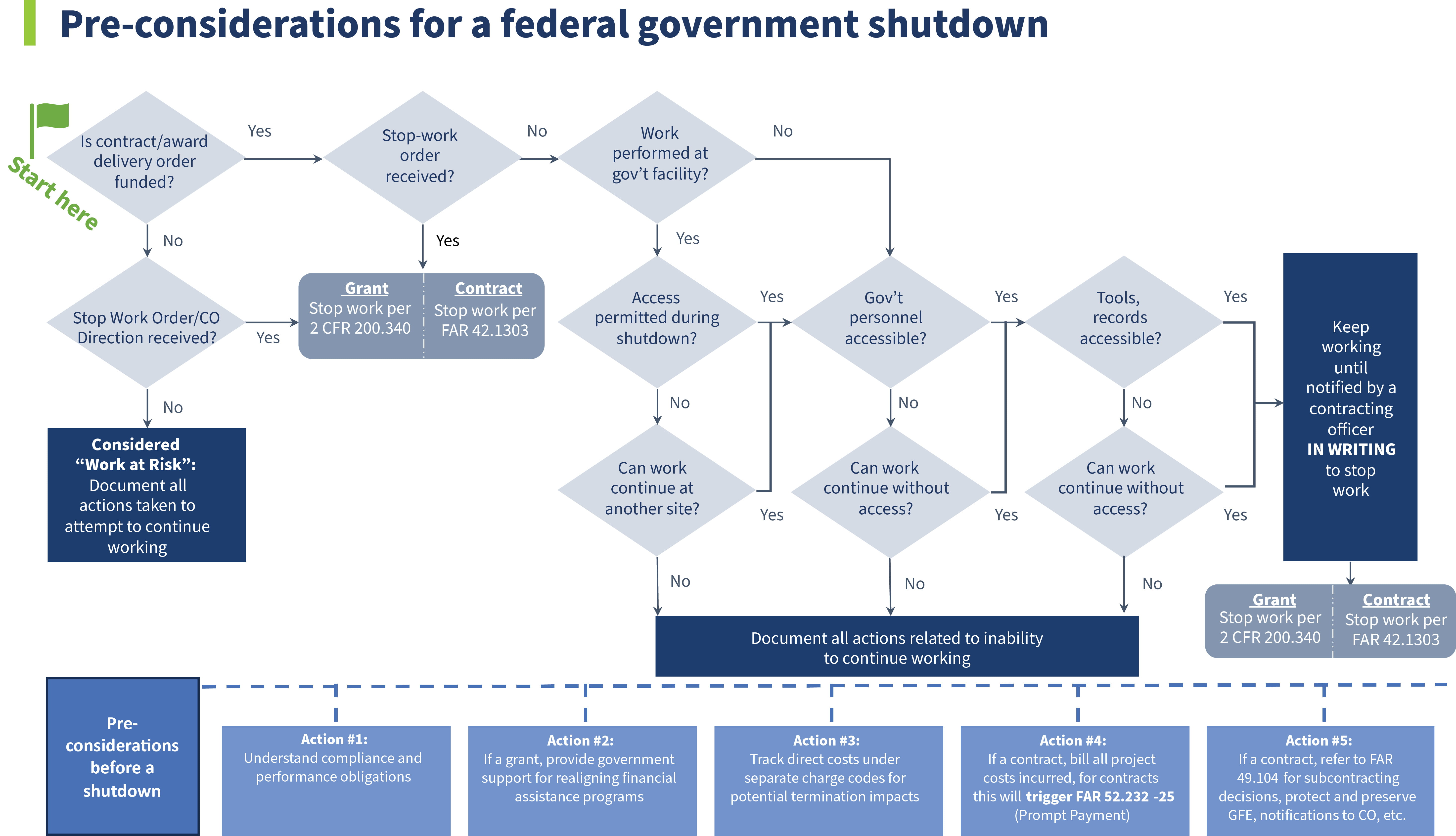Our solutions are tailored to each client’s strategic business drivers, technologies, corporate structure, and culture.
Weathering a federal government shutdown: What contractors should know and do
In the event of a shutdown, should contractors stop or keep working? What should be tracked and reported? Read our essential tips, plus a flowchart tool.
What should government contractors do should a federal shutdown go into effect? Stop or continue working? What should be tracked and reported? Read on for our essential tips, including a flowchart to help you assess your exposure.
What federal contractors need to know about a shutdown
Funded contracts: Regardless of contract type (firm fixed-price, cost plus, time and materials, etc.), funded contracts should remain unaffected as long as access to government facilities or personnel is available. If access is restricted, performance may not continue, and direct costs incurred during this period may not be allowable. It’s crucial to document any inability to work (e.g., locked government facilities, no access to personnel).
Stop-work orders: If you receive a stop-work order, the situation changes. This scenario isn’t necessarily the worst-case, as specific rules govern the allowability of shutdown costs. (Refer to FAR Subpart 42.1303.)
Antideficiency Act: The Antideficiency Act (31 U.S.C. Section 1342) prohibits the government from accepting “voluntary services” from contractors. Do not volunteer services, as you will not be paid, and it may affect your ability to recover other shutdown-related costs, such as unabsorbed overhead and employee separation costs.
Reporting deadlines: Reporting dates will not change due to a government shutdown. Even if there is no one available to receive your filing (e.g., GAO, DCAA, DCMA), you must still meet filing deadlines.
Below is a flowchart that CohnReznick developed to help assess shutdown exposure on a contract-by-contract basis. Contractors should distribute the flowchart to project managers, have them annotate it with task or contract names/numbers and values, and highlight each active contract or task order. This will help compile a comprehensive picture of the shutdown’s impact and serve as a good start for an action plan.
What a federal contractor should do now
- Stay informed: Keep up to date with the latest news and developments regarding the shutdown. Follow reliable news sources and government announcements to stay informed about any changes or updates.
- Review contracts: Carefully review your contracts to understand the potential impact of a shutdown on your projects. Identify any clauses related to funding and performance during a shutdown. Submit invoices promptly.
- Communicate with clients: Maintain open lines of communication with your federal clients. Discuss potential impacts and contingency plans to help ensure that both parties are prepared for any disruptions.
- Develop contingency plans: Create contingency plans to address potential disruptions in your operations. This may include identifying alternative funding sources, adjusting project timelines, and reallocating resources.
- Staffing: Determine which staff would be idled by a shutdown and decide what to do with them (overhead vs. furlough). This may be a good time for vacations or training. Review WARN Act employee advance notification requirements to see if they apply to your company.
- Subcontractors: Make a plan for what you will do with subcontractors, and review your subcontract provisions to make sure you can implement your plan.
- Communications: Develop a communication plan to be used during the shutdown, and establish the mechanisms now.
- Cash flow: Plan for an interruption in cash flow and consult with your bankers in advance.
- Accounting: Make sure Accounting can segregate shutdown costs in case they are recoverable.
- Stay flexible: Be prepared to adapt to changing circumstances. A shutdown can create uncertainty, so it’s important to remain flexible and responsive to new developments.
Webinar: Transformation of the federal government landscape - Surviving change
Contact
Let’s start a conversation about your company’s strategic goals and vision for the future.
Please fill all required fields*
Please verify your information and check to see if all require fields have been filled in.
Related services
This has been prepared for information purposes and general guidance only and does not constitute legal or professional advice. You should not act upon the information contained in this publication without obtaining specific professional advice. No representation or warranty (express or implied) is made as to the accuracy or completeness of the information contained in this publication, and CohnReznick, its partners, employees and agents accept no liability, and disclaim all responsibility, for the consequences of you or anyone else acting, or refraining to act, in reliance on the information contained in this publication or for any decision based on it.























